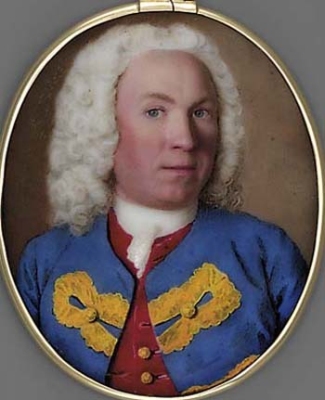A couple of posts ago, I pie-charted all of the gifts that the Thursday's Club received, and if you remember, "pickled salmon" came in second. But while venison, the clear winner, was gifted by many different people over the years, all of the salmon came from one man.
Who was the Earl of Marchmont?
Turns out his name was Hugh Hume Campbell, a Scottish aristocrat who doubled as a (not terribly successful) politician. He was elected a F.R.S. (Fellow of the Royal Society) in 1753. But apparently membership in the most prestigious scientific organization in the world didn’t really do it for him. He coveted membership in the dining club.
But why all this pickled salmon? Every time he gifted it to the Club, it would recur on the weekly menus for the next month, suggesting that nobody really wanted to eat it. (By contrast, when turtle appeared on the menu, it was always polished off that same evening.) But since the salmon hadn't yet gone bad in a week –– that was the point of pickling –– the dish would reluctantly be placed on the table week after week in hopes that some naïve and particularly ravenous guest would take it off the Club's hands.
Pickled salmon never appeared on the menu otherwise. But what was it? And what did it taste like?
I decided to consult Hannah Glasse, one of the most esteemed celebrity chefs of the 18th century. In her best-selling "The Art of Cookery, Made Plain and Easy" the following recipe appeared:
“The Jews way of Preserving Salmon, and all Sorts of Fish”
"Take either salmon, cod, or any large fish, cut off the head, wash it clean, then flour it and dip it in the yolks of eggs, and fry it in a great deal of oil..."
"have your pickle ready, made of the best white wine vinegar, in which you must boil a great many cloves of garlic and shallot, black and white pepper, Jamaica and long pepper, juniper berries and salt..."
"to have the pickle ready, first put a little pickle in, then a layer of fish, then pickle, then a little fish, and so lay them down very close; and to be well covered, put a little saffron in the pickle..."
The whole point of doing things the "Jews way," according to Glasse, was that you could ship it to the East Indies for months and it wouldn't go bad. So, could Glasse be implying that pickled salmon was an 18th century version of gefilte fish? And if so, what was Marchmont thinking? Gefilte fish does the trick when you’re trying to remember the brutal slavery once endured by your people. But no one really wants to see it again for the other 364 days of the year.
Let’s see if Marchmont's salmon helped his chances with the Club.
--Shortly after his election to the Royal Society, he starts sending salmon to the dining club, starting in April of 1754.
--But he isn't nominated for membership in the Thursday’s Club until almost three years later: April 20, 1757. (He gives salmon 8 times up to this point.)
--And then, one week after his official nomination, he donates more salmon, and:
“Lord Macclesfield was so good to promise that he receive the thanks for the society to Lord Marchmont for it.”
This is a good sign. Lord Macclesfield was not only the President of the Thursday's Club but President of the entire Royal Society. With his blessing, things were definitely looking up.
But it seems like there were some doubts about Marchmont. If he was nominated in April of 1754, the earliest he could be voted in would be July of 1754, when the Club had its annual meeting and elections. But Marchmont wasn’t actually elected until 1759... 5 years after his nomination!
Did the salmon have something to do with it? I think its very possible.
(Post script: Marchmont actually gets kicked out of the club for non-attendance in 1770, despite annual shipments of pickled salmon. But even after he is ousted, he still sends a shipment two years later, for which the Club begrudgingly offered its thanks. He died in 1794.)


Lovely blog you havee here
ReplyDelete